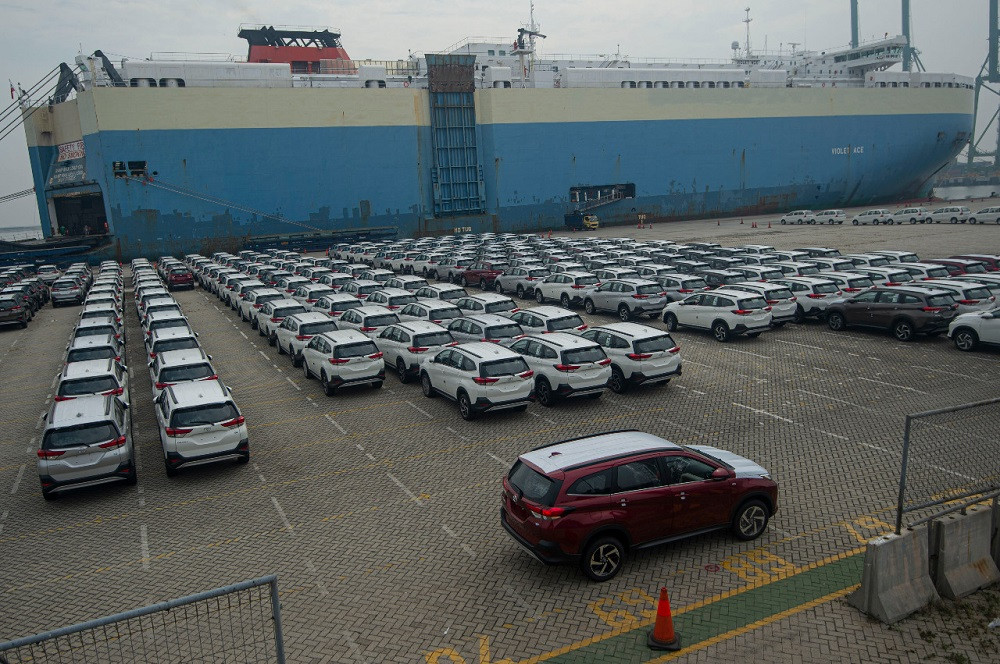Popular Reads
Top Results
Can't find what you're looking for?
View all search resultsPopular Reads
Top Results
Can't find what you're looking for?
View all search resultsIndonesia’s new economic status: Challenges for exports
The latest WTO statistics show that Indonesia has been one of the most targeted countries in global antisubsidy investigations from 1995 to 2019.
Change text size
Gift Premium Articles
to Anyone
I
ndonesia celebrates its 75th anniversary of independence with a new economic status. Earlier last month, the World Bank raised Indonesia’s status from that of a lower-middle-income economy to that of an upper-middle-income economy.
Indonesia has now officially joined other big economies like China, Brazil, South Africa, Turkey, Malaysia and Thailand. With this new status, Indonesia is one step closer to becoming a high-income country, the highest level of economic status according to World Bank’s classification.
The World Bank uses this classification as a factor to determine a country’s eligibility to use the Bank’s facilities, including loan pricing. The upgraded status is also expected to improve the investment climate, boost trade and enhance economic the competitiveness of the country.
Despite the benefits that the improved rating will bring, it might also pose new challenges for Indonesia that need to be anticipated. One of these is related to the eligibility for trade remedy instruments.
Trade remedies are exceptions to the World Trade Organization’s free-trade principles. These remedies are divided broadly into antidumping measures, antisubsidy measures and safeguard measures. Each of them is triggered in response to different circumstances and requires specific conditions for a government to take remedial action against imports that are causing injury to a domestic industry.
However, WTO rules provide special and differential treatment (S&DT) provisions for developing countries, in particular on antisubsidy and safeguard measures. These provisions are crucial for a developing country to be excluded from antisubsidy and safeguard measures taken by other countries.
First, the WTO Agreement on Subsidies and Countervailing Measures, which regulates the use of antisubsidy measures, sets higher standards for determining the de minimis subsidy level for developing countries, namely 2 percent, whereas the de minimis subsidy level for developed countries is 1 percent. In other words, an investigating authority has to find a minimum level of subsidies of 2 percent instead of 1 percent, as one of the requirements for imposing an antisubsidy duty on products imported from developing countries.
Further, an antisubsidy investigation has to end if the volume of subsidized imports from a developing country is negligible, i.e., less than 4 percent of total imports of the product. A similar provision is available for safeguard investigations, but with a different threshold. A safeguard measure can only be applied to a product from a developing country if the import volume is more than 3 percent.
One of the main issues with regard to the application of these S&DT provisions is which developing countries should benefit from them. The matter is getting more complicated, since the WTO rule is silent on the definitions of developed and developing countries. Its members are allowed to self-declare their own economic status. However, other members can challenge the eligibility of another member to make use of the S&DT provisions available to developing countries.
The United States and Canada are among the WTO members that have developed their own criteria to determine a list of developing countries entitled for those S&DT. Last February, the US removed some developing countries that are eligible for special the de minimis subsidy level and negligible import volume standards for antisubsidy investigations, including Indonesia.
Although Indonesia is not classified as a high-income country by World Bank, the US now considers Indonesia a developed country due to its share of world trade, which is more than 0.5 percent, and its membership in the Group of 20. As such, Indonesia is no longer eligible for the S&DT in antisubsidy investigations.
Years before the US, namely in 2015, Canada had removed Indonesia from its General Preferential Tariff (GPT) scheme, which in turn affected Indonesia’s eligibility to S&DT in safeguard investigations. Canada’s GPT is a nonreciprocal preferential tariff scheme for imports from developing countries.
Withdrawal of a country from Canada’s GPT program is either due to its classification as an upper-middle income economy by the World Bank or by it accounting for 1 percent of world exports or more for two consecutive years. In Canada, removal of a developing country from the beneficiaries list of the GPT also means it is no longer qualified for the S&DT available in safeguards instruments.
Indonesia’s new economic status may prompt more countries to consider it no longer a developing country. In other words, there will also be a higher chance for Indonesian exports to be subjected to antisubsidy and safeguard measures by other countries, as the S&DT provisions will not be applicable to Indonesia.
It becomes even more challenging since the trade ministers of Japan, the US and the EU made a joint statement last January to strengthen the existing WTO rules on industrial subsidies, including the role of state-owned enterprises (SOEs). It is possible that more types of subsidy programs might then be challenged by other countries in the coming years.
The latest WTO statistics show that Indonesia has been one of the most targeted countries in global antisubsidy investigations from 1995 to 2019. Indonesia placed fourth with a total of 28 antisubsidy cases against it, below China (169), India (89), and South Korea (31). The statistics on global safeguard investigations also indicated a significant increase in its use from 17 investigations in 2015 to 30 investigations in 2019.
In spite of the growing number of trade remedies investigations of Indonesian exports and new challenges that may arise in the future, exports should further be bolstered to fuel economic growth through better cooperation between the government and the private sector.
***
The writer is an analyst at the Ministry of Trade. The views expressed are his own.










